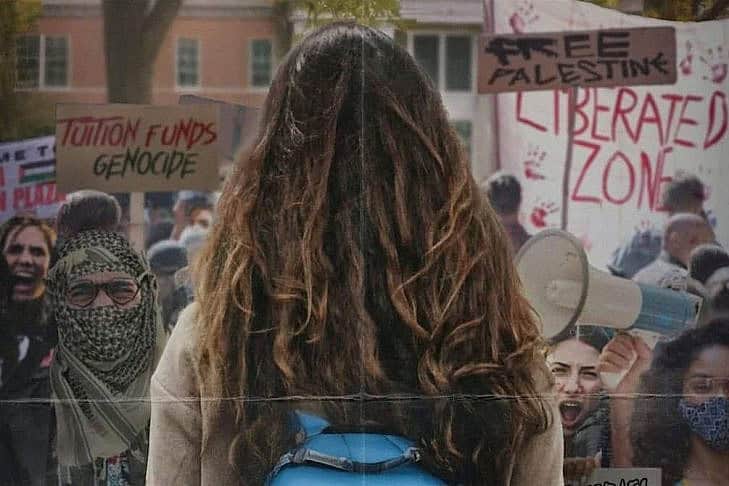|
Getting your Trinity Audio player ready...
|
“Blind Spot”: Landmark Documentary on Campus Antisemitism to Premiere on JBS, March 30th
In a timely and urgent cinematic release, the Jewish Broadcasting Service (JBS) will host the exclusive television premiere of “Blind Spot” a searing new documentary that confronts one of the most troubling phenomena in modern American academic life: the explosion of antisemitism on college campuses. The broadcast premiere is scheduled for Sunday, March 30, 2025, at 7:00 PM EDT, and will be followed by an in-depth interview with Executive Producer Leonard Gold on a special edition of “A Special Look” with Teisha Bader at 8:35 PM EDT.
The film—produced by Ironbound Films, known for such acclaimed works as “Israel Swings for Gold and Heading Home: The Tale of Team Israel”—is also currently available on streaming platforms and will air with closed captioning. Additional encore showings will follow at 11:00 PM EDT that same evening and throughout the week.
As reported by JBS, Blind Spot is the first and only film to examine the trajectory of antisemitism on U.S. campuses both before and after the October 7, 2023, Hamas attacks on Israel, an event that served as a cultural and ideological flashpoint, unleashing a tidal wave of anti-Jewish sentiment in institutions of higher learning across America.
Told through the firsthand accounts of more than two dozen Jewish students from over a dozen universities, the film paints a disturbing picture of how normalized anti-Israel hostility has metastasized into open antisemitism, often escalating into verbal harassment, physical threats, and academic discrimination.
These students are not political activists or public figures. They are ordinary undergraduates and graduate students—many of whom, until recently, considered their Jewish identity to be a quiet, private part of who they are. What Blind Spot makes abundantly clear is that this is no longer an option. In today’s academic climate, Jewish students are being forced to choose between silence and self-respect, between social comfort and spiritual truth.
For Leonard Gold, a lawyer by training and a father moved by personal experience, this documentary is deeply personal. Gold was first awakened to the problem of school-based antisemitism in 2009, when one of his own sons endured virulent anti-Jewish hostility at a prestigious private school in New York City. What began as a personal struggle evolved into a broader mission: to expose the ideological rot permeating American campuses and to empower students to stand up for themselves and their people.
“Blind Spot is not just a film,” Gold explains in his upcoming JBS interview. “It’s a call to action—a refusal to look away from what’s happening to our kids in institutions we thought would help shape them, not break them.”
The documentary serves as a witness, but also as a clarion call to Jewish parents, community leaders, donors, and policymakers: the problem is real, it is widespread, and it must be confronted.
Blind Spot does not limit its focus to headline-making protests or high-profile scandals. It lays bare a systemic failure of university leadership to protect Jewish students from hostile learning environments, even as they enforce strict standards for other protected groups.
JBS reported that the film’s central theme is this: Jewish students are at the front lines of a modern-day civil rights struggle. Whether in lecture halls, dormitories, or student government chambers, they are being singled out, marginalized, and attacked—not for what they’ve done, but for who they are and what they represent.
The campuses themselves may appear picturesque—brick-lined quads, leafy greens, and ivy-covered buildings—but the intellectual climate, the social atmosphere, and the moral posture toward Jewish identity is, in many cases, toxic.
The documentary exposes a through-line of demonization of Israel that morphs seamlessly into the demonization of Jews. Asking Jewish students to renounce their connection to Israel or face exclusion is not political discourse—it is a modern form of antisemitism cloaked in the language of social justice.
One of the most powerful insights of Blind Spot is how this escalating hostility is catalyzing a spiritual and cultural awakening among Jewish students. Many of them, raised in environments where Jewishness was an incidental or quiet part of their identity, are now being forced to reckon with what it means to be Jewish in a world that targets Jews with venomous hatred.
This is not just about geopolitics. It’s about personal courage, collective memory, and the unshakable dignity of self-definition. The students featured in the film are not merely victims; they are heroes. They are the inheritors of a long tradition of resilience, and they are choosing to speak, protest, and live proudly in the face of intimidation.
As universities across America continue to grapple—or fail to grapple—with antisemitism, Blind Spot arrives at a critical moment. It reminds viewers that silence is complicity, and that the failure to respond to campus Jew hatred is not just an institutional failure—it is a moral collapse.
Through powerful interviews, harrowing anecdotes, and an unflinching gaze at the culture of denial and appeasement, the film challenges us to see what so many have chosen not to see. It demands that viewers confront the uncomfortable truth: antisemitism is alive and well in American academia, and its consequences are devastating.
For anyone concerned about the future of Jewish life in America—or the integrity of higher education—Blind Spot is essential viewing. It is an indictment, an inspiration, and above all, a mirror held up to a society that must now decide what it will do with what it sees.
Because once you’ve seen it, you can’t look away.





